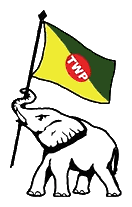True Whig Party
True Whig Party | |
|---|---|
 | |
| Historic leaders | Edward James Roye, Anthony W. Gardiner, William Tubman, William R. Tolbert Jr. |
| Founded | 1869 |
| Preceded by | Opposition Party |
| Headquarters | Monrovia |
| Ideology | Black conservatism[1] Centralization Protectionism |
| Political position | Right-wing |
| International affiliation | None |
The True Whig Party (TWP), also known as Liberian Whig Party, is the oldest political party in Liberia. Founded in 1869 by primarily Americo-Liberians, the party dominated Liberian politics from 1878 until 1980. The nation was virtually a one-party state, although opposition parties were never outlawed.[2] Initially, its ideology was strongly influenced by that of the United States Whig Party (which was later succeeded by the Republican Party).
History
The political party was founded in the township of Clay-Ashland in 1869 as a reorganised version of the Opposition Party.[3][4][5] It presided over a society where Black American settlers and their descendants, known as Americo-Liberians, constituted nearly 100% of the citizens able to vote. It primarily represented them, often working in tandem with the Masonic Order.[citation needed]
The party endorsed systems of forced labour. In 1930 they sent "contract migrant laborers", under conditions tantamount to slavery, to Spanish colonists on Fernando Pó in Spanish Guinea (now Bioko in Equatorial Guinea), leading to a five-year U.S. and British boycott of Liberia.[citation needed] Despite this dispute, the West considered the True Whig Party as a stabilizing, unthreatening force. The US and Britain invested extensively in the nation under William Tubman's long period of rule (1944–1971).
The party lost power after Tubman's successor, William Tolbert, was killed in an April 1980 military coup by a group of soldiers of the People's Redemption Council. They opposed his clampdown on the political opposition and his tolerance of corruption. The opposition restricted activities of the True Whig Party; the vast majority of its members and supporters left the party, but it struggled on as a minor party. Members of indigenous groups began to exert more political power, in keeping with their dominance in number of the national population.
Legacy
In 1991, the party faced a challenge from a new group, which identified as the "National True Whig Party of Liberia." TWP chairman Momo Fahnbulleh Jones threatened legal action to induce the newly founded party to change its name.[6]
The party participated in the 2005 general election as part of the Coalition for the Transformation of Liberia, which dissolved the next year. It registered to compete as an individual party in the 2011 general election, while endorsing President Ellen Johnson Sirleaf's bid for a second term.[7] However, the party had strife over its leadership five months before the election,[8] and it failed to nominate any candidate for any legislative seat.
See also
References
- ^ Carl Patrick Burrowes (2004). Power and Press Freedom in Liberia, 1830-1970. Africa World Press. p. 312.
- ^ "Liberia Country Study: The True Whig Ascendancy" Global Security
- ^ Shillington, Kevin (2005). Encyclopedia of African History. Vol. 1. Fitzroy Dearborn. ISBN 978-1-57958-245-6.
- ^ Donald A. Ranard, "Liberians: An Introduction to their History and Culture" Archived 2015-04-09 at the Wayback Machine, Center for Applied Linguistics, April 2005
- ^ Carl Patrick Burrowes (2004) Power and Press Freedom in Liberia, 1830-1970: The Impact of Globalization and Civil Society on Media-government Relations, Africa World Press, p85
- ^ "True Whig Party To Sue If...", The Eye, 23 July 1991: pp. 7/8
- ^ Kwanue, C.Y. (June 17, 2011). "TWP Endorses Ellen's 2nd Term". Daily Observer. Archived from the original on September 28, 2011.
{{cite news}}: Unknown parameter|deadurl=ignored (|url-status=suggested) (help) - ^ "Power Struggle in TWP: Partisans Demand Leadership Out But...", Liberian Observer 2011-05-23: 1/10.
